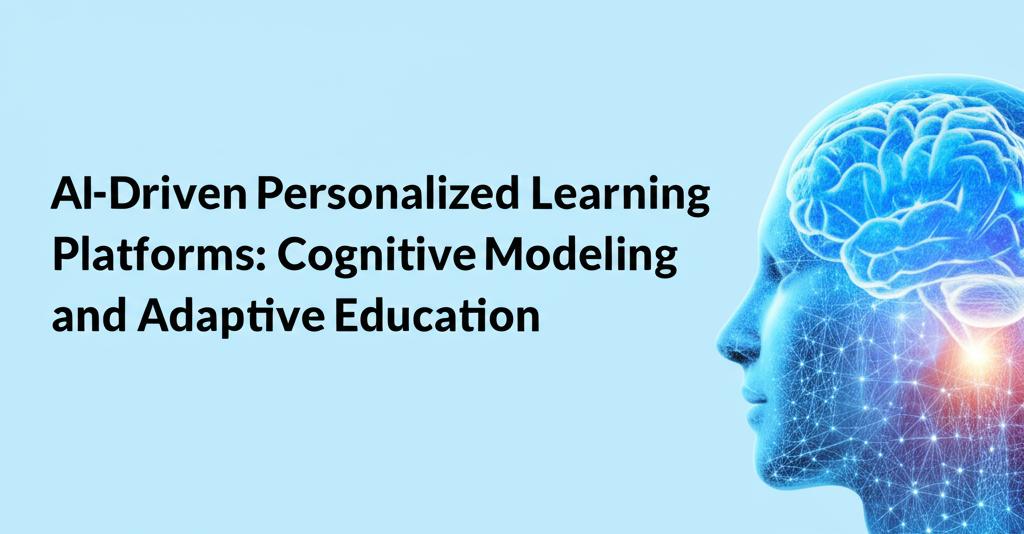Artificial intelligence (AI) is revolutionizing the educational landscape by enabling highly personalized learning experiences. These AI-driven platforms utilize cognitive modeling and adaptive technologies to tailor instruction to individual student needs, learning styles, and paces. This approach marks a significant shift from traditional one-size-fits-all educational models.
Cognitive Modeling: The Foundation of PersonalizationAt the heart of these advanced platforms lies cognitive modeling. This involves creating a computational representation of a student's cognitive processes, including how they acquire, retain, and apply knowledge. By analyzing vast amounts of student data – such as interaction patterns, performance on assessments, and even physiological responses like eye-tracking – AI algorithms can build a detailed understanding of each learner's unique cognitive profile. This profile includes their strengths, weaknesses, knowledge gaps, and preferred learning modalities. This in-depth understanding is crucial for creating truly adaptive and effective learning pathways.
Adaptive Education: Tailoring the Learning JourneyArmed with insights from cognitive models, AI-powered platforms can then deliver adaptive education. This means the content, pace, and even the instructional strategies dynamically adjust in real-time based on the student's performance and engagement. If a student is struggling with a particular concept, the system might offer additional explanations, simpler examples, or alternative modes of instruction. Conversely, if a student demonstrates mastery, the platform can introduce more challenging material or accelerate the learning pace. This continuous assessment and adjustment ensure that learners receive the right level of challenge and support at the right time, maximizing their engagement and learning outcomes.
Key Features and Benefits:- Personalized Learning Paths: AI systems create individualized learning trajectories for each student, focusing on areas where they need the most support and allowing them to progress at their own speed.
- Real-time Feedback and Support: Students receive immediate and targeted feedback on their work, helping them identify and correct misconceptions quickly. AI-powered tutors and chatbots can provide instant support and answer student queries, mimicking one-on-one guidance.
- Enhanced Engagement and Motivation: By tailoring content to individual interests and providing interactive learning experiences like simulations and gamification, these platforms can significantly boost student engagement and motivation.
- Data-Driven Insights for Educators: AI tools can provide teachers with valuable insights into student progress, helping them identify at-risk students and understand which teaching strategies are most effective. This reduces teacher workload in areas like grading and allows them to focus more on direct student interaction.
- Improved Learning Outcomes: Studies have shown that students using adaptive learning platforms can achieve significantly better learning outcomes and progress faster than those in traditional classroom settings.
The field of AI-driven personalized learning is rapidly evolving. Some of the key trends include:
- Generative AI for Content Creation: Tools like ChatGPT are being used to create educational content, assist with lesson planning, and further enhance the personalization of learning.
- AI Agents and Copilots: AI-based assistants are increasingly supporting both teachers with administrative tasks and students with immediate academic help.
- Integration of Neuro-Adaptive Technologies: Emerging technologies, including brain-computer interfaces (BCIs) and wearable neurotechnology, are being explored to gain deeper insights into students' cognitive and emotional states in real-time, allowing for even more precise adaptations.
- Focus on Skills and Workforce Pathways: There's a growing emphasis on aligning education with industry needs, with AI helping to create flexible learning models and pathways that equip students with workforce-ready skills.
- Immersive Learning Environments: AI is being used to create and adapt immersive learning scenarios in virtual and augmented reality, offering highly engaging and personalized simulations for various fields.
Despite the immense potential, the implementation of AI-driven personalized learning platforms also presents challenges:
- Data Privacy and Security: The collection and analysis of vast amounts of student data raise significant privacy and security concerns. Robust data protection measures are crucial.
- Algorithmic Bias: AI algorithms can perpetuate or even amplify existing biases if the data they are trained on is not diverse and representative.
- Equity and Access: Ensuring that all students, regardless of their socioeconomic background, have access to the necessary technology and internet connectivity is a critical challenge.
- Teacher Training: Educators need adequate training and professional development to effectively integrate AI tools into their teaching practices and interpret the data these systems provide.
- Ethical Considerations: Ensuring the responsible and ethical use of AI in education, including transparency in how AI makes decisions, is paramount.
AI-driven personalized learning platforms, underpinned by sophisticated cognitive modeling and adaptive technologies, hold the transformative potential to reshape education. By tailoring learning experiences to individual needs, these platforms can enhance student engagement, improve learning outcomes, and foster a more equitable and effective educational landscape. While challenges related to data privacy, bias, equity, and teacher preparedness need careful consideration and proactive solutions, the continued advancement and thoughtful implementation of these technologies promise a future where learning is truly personalized and empowering for every student.

